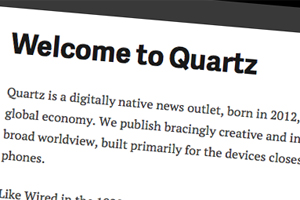It isn’t just publishing businesses that need to think about mobile first
 A publishing revolution is taking place and industries of all shapes and sizes need to be ready for the change – mobile will soon become the dominant technology over desktop computing and businesses need to align themselves for this new way of doing things.
A publishing revolution is taking place and industries of all shapes and sizes need to be ready for the change – mobile will soon become the dominant technology over desktop computing and businesses need to align themselves for this new way of doing things.
Speaking last week at the launch of IMC’s Innovations in Magazine Media report, Juan Señor, a partner with Innovation Media Consulting, outlined how he thought the news publishing industries would be affected by the shift to a mobile, adding that this wasn’t a change that would happen in two or four years time, mobile first was happening right now.
“This is the mobile moment,” he said. “The tipping point where mobile traffic overtakes desktop.”
Señor outlined several major trends for publishers – including video, big data, native and programmatic advertising – but said top of his agenda was the development of a mobile strategy. His viewpoint chimes with that of Microsoft’s new CEO Satya Nadella who said during his recent launch of the Office suite of programmes for iPad that his firm’s outlook was now on developing services for a “mobile first, cloud first world”.
Right across the media market publishers are adapting strategies to meet rising mobile traffic. Quartz, the Atlantic’s mobile-first business news site, has won five million readers in just 18 months, and the publisher is now planning to expand into India to take advantage of the huge growth in mobile use in that region and the shift in behaviour to where it’s mobile first.
Publishing and technology business will naturally be at the forefront of developing products for new and emerging consumer trends, but that doesn’t mean that businesses that traditionally had little to do with publishing can ignore the impact of mobile. After all, most businesses now have to embrace media and look at developing their own publishing strategies – so, consequently, that means looking at mobile.
Howard Scott, the National Trust’s Head of Digital, has been focusing on developing its mobile platforms. In a recent interview with The Drum, he revealed that prior to the Christmas period 40% of his site traffic came from mobile devices, but that reached 58% in the New Year.
“That started ringing some quite severe alarm bells,” he said. “Not only did we see people coming to us from different devices, but we started seeing patterns from different parts of the country as well. Our audience started to lead the way, way beyond when we thought we would get there. So mobile is a priority for us.”
While the National Trust may have cottoned-on to the need to look more closely at mobile publishing, other industries are lagging behind.
A recent survey of CIOs from different industries found that the healthcare services sector had the greatest number of businesses (36%) with no mobile technology strategy, compared to an average of about 28%.
Mobile isn’t just an issue for media companies. Any business with an online presence needs to start considering previously alien terms like “responsive design” and “app development” otherwise they will soon find themselves left behind.
And in business, left behind means out of the game.